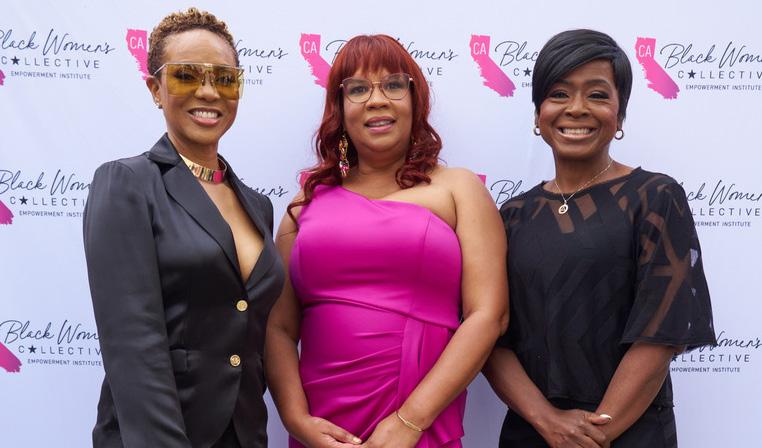
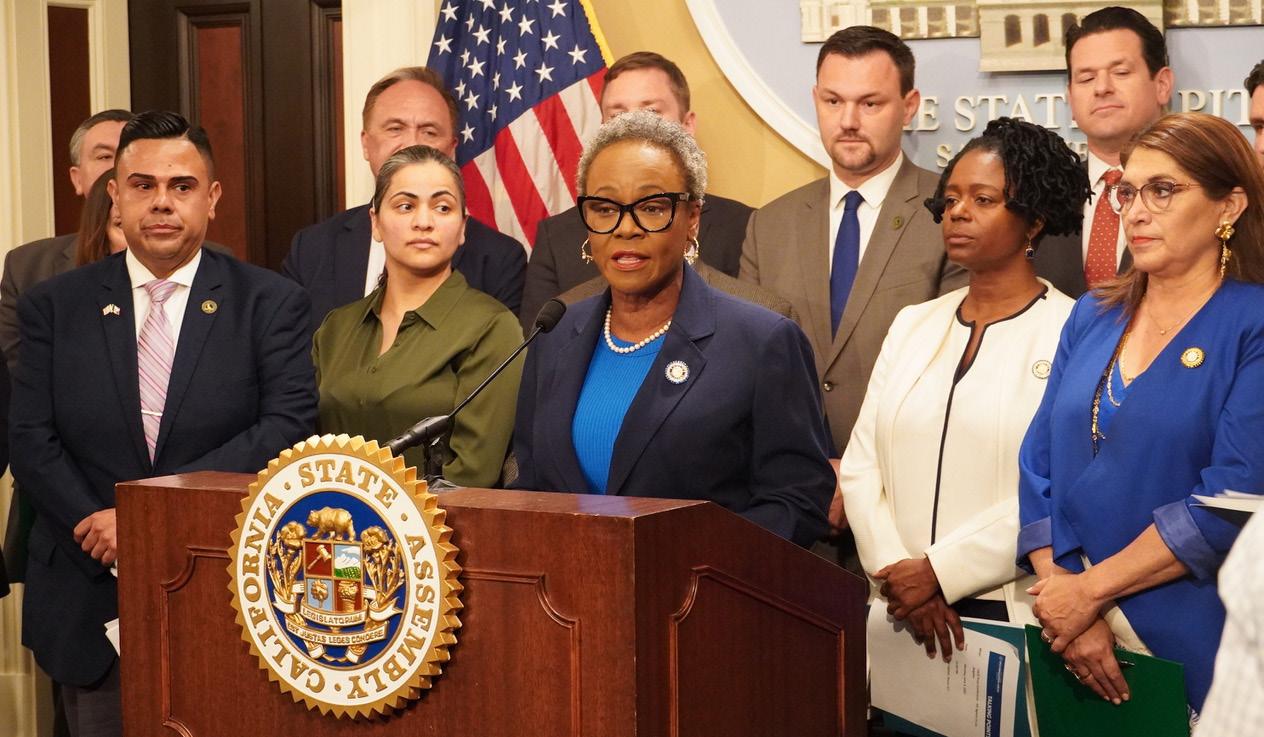
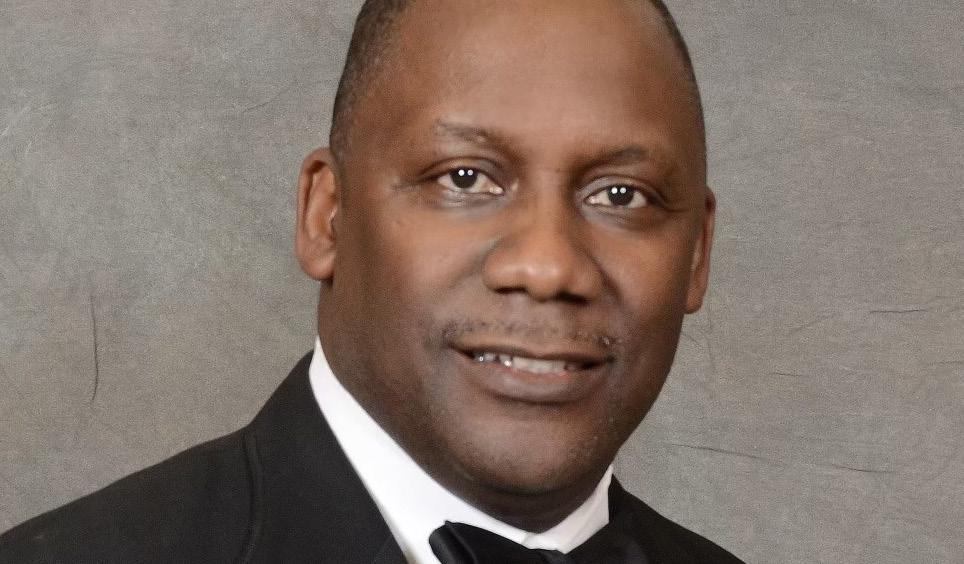
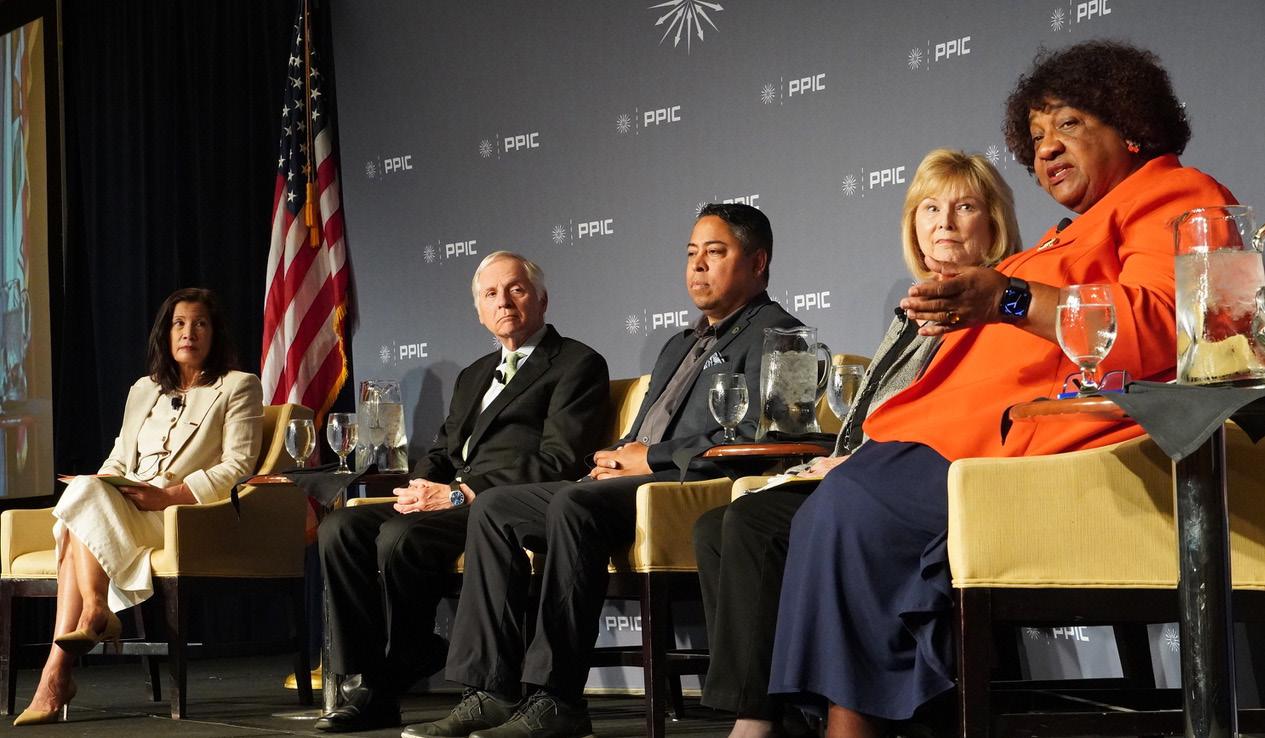







By Magaly Muñoz
New Oakland Mayor Barbara Lee, along with council members and city leaders, hosted two community listening sessions Thursday afternoon to speak with residents and answer their most pressing questions across topics like public safety, blight, and economic development.
In an effort to understand what
is of top concern to the community, Lee kicked off the series at Cypress Mandela Training Center in East Oakland, which laid the ground for the first sets of questions on funding for job training in the new budget. Lee explained that although the Summer Youth Employment Program, which the city created to help youth ages 16 to 21 years old

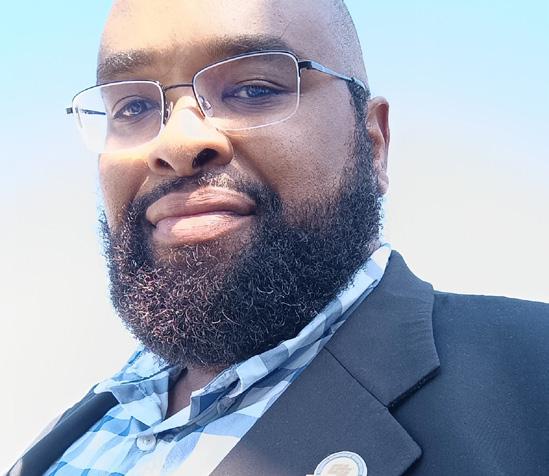
By Wayne Wilson Caltrans
By Post Staff
Over 10,000 people filled City Hall plaza in downtown Oakland last Saturday for a “No Kings” march and rally, joining more than 5 million protesters nationwide for a “Day of Defiance” against President Donald Trump, denounced by many as a lawless leader who has
transformed the government into an authoritarian regime and mobilized soldiers and masked federal agents to suppress and detain U.S. citizens and residents.
Crowds estimated at more than 140,000 people attended rallies and marches in cities and towns throughout the Bay Area, including

By Carla Thomas
The annual “Juneteenth Scholarship Graduation Ceremony” was held at the Oakland California Temple on Lincoln Avenue on Saturday, June 14.
Supported by the collaborative efforts of the Oakland Unified School District (OUSD), Oakland Promise, and legacy funds of Holy Names University scholars, dozens of students received scholarships to Historically Black Colleges and Universities (HBCUs) and predominantly white institutions.

Minister Brandon Waugh served as master of ceremony.
Rayland Albert and the Ensemble of the NAACP Oakland Imani Youth Council and ACTSO performed the Black National Anthem. Program participants included sponsors Mary Ches-
tang of Oakland Promise, Jerome Gourdine of OUSD, and Steven Borg of Legacy Funds of Holy Names University.
Alameda County Superior Court Judge Terry Wiley provided words of acknowledgement and Donovan Loud introduced honoree attorney Gordon D. Greenwood, a distinguished alumnus of Morehouse College.
Other program participants included NAACP Oakland Education Chair Dr. Dela Morris and Soraya Wright of Legacy Funds of Holy Names University.
Spelman College graduate Janae Burks and Morehouse College graduate, Dwayne Pittman III, inspired attendees with keynote speeches.
Students were presented awards from the NAACP Oakland
Juneteenth marks an important moment in our shared history—a time to reflect on the legacy of our ancestors who, even in the

face of injustice, chose freedom, unity, and community over fear, anger, and hopelessness. We honor their resilience and the paths they paved so future generations can continue to walk with pride.
It’s been empowering to watch Juneteenth blossom into a widely celebrated holiday, filled with vibrant outdoor events like cookouts, festivals, parades, and more. It’s inspiring to see the community embrace our history—showing up in droves to celebrate freedom, a freedom delayed for some enslaved Ameri-
The Case Against Probate: Appellate Court Upholds Ruling to Deny Estate Inheritance Despite Evidence Dr. Laura Dean Head. Her former student, Sarah Burnsides, said: “It was as if she had a crystal ball and could see the future. What Dr. Head had was better than any crystal ball, it was her knowledge of people and life that gave her the wisdom she bestowed upon her students.” Dr. Head passed June 19, 2013. Courtesy photo.
By
Tanya Dennis
Part 6
Dr. Laura Dean Head, a professor at San Francisco State University for 35 years, taught

alongside Dr. Nathan Hare, Asa Hilliard and was a colleague and friend to Ben Chavis, activist, author, journalist, former president of the national NAACP and current president and CEO of the National Publisher’s Association and national co-chair for the political organization No Labels.
Head taught “African Americans and Western Racism,” “Intro to Black Psychology, Race, Class and Gender,” “Black Child Development,” “The Economics of Poverty and Discrimination” and a call on “Black Feminist Women.”
Head always encouraged people to challenge authority. One of Head’s famous quotes was “Education equals knowledge. knowledge equals power. power equals freedom.”
Head’s powerful lessons have proven beneficial to Head’s former student and friend Zakiya Jendayi as Jendayi fights for Head’s estate
mously approved a $450,000 grant to ICAC to operate and expand its Safe Car Park to one other location. The grant agreement is on the way and meeting attendees were eager to discuss how their organizations and congregations can collaborate for the launch of the new Safe Car Park.
ICAC President Ken Chambers announced that Williams Chapel Baptist Church, located in Oakland City Council District 2, will be the site for a second Safe Car Park program. The 12th Street homeless encampment in
2 was recently closed, making the opening of the pro
for unhoused residents.
Two hundred thousand dollars

By Bo Tefu California Black Media
On June 13, the California Black Women’s Collective Empowerment Institute (CBWCEI) hosted its annual event honoring over two dozen women from across California at the Luxe Sunset Boulevard Hotel in Los Angeles. Themed “The Power of Her: Honoring the Black Women’s Strength, Resilience, and Brilliance,” the evening celebrated the extraordinary leadership of Black women making an impact in every corner of society — from grassroots movements to state government and beyond.
This year’s event was cochaired by hip-hop icon MC Lyte and nationally recognized
financial empowerment strategist Dr. Lynn Richardson. Together, they helped create a space where Black women — often the behindthe-scenes changemakers — were placed squarely in the spotlight, celebrated for their brilliance, resilience, and unwavering dedication to community.
“This event is special because we are honoring our best and brightest,” said Kellie Todd Griffin, President and CEO of CBWCEI.
“We’re creating a safe space for Black women who work tirelessly behind the scenes to have their brilliance recognized and their impact felt — not only across our state but across the nation.”
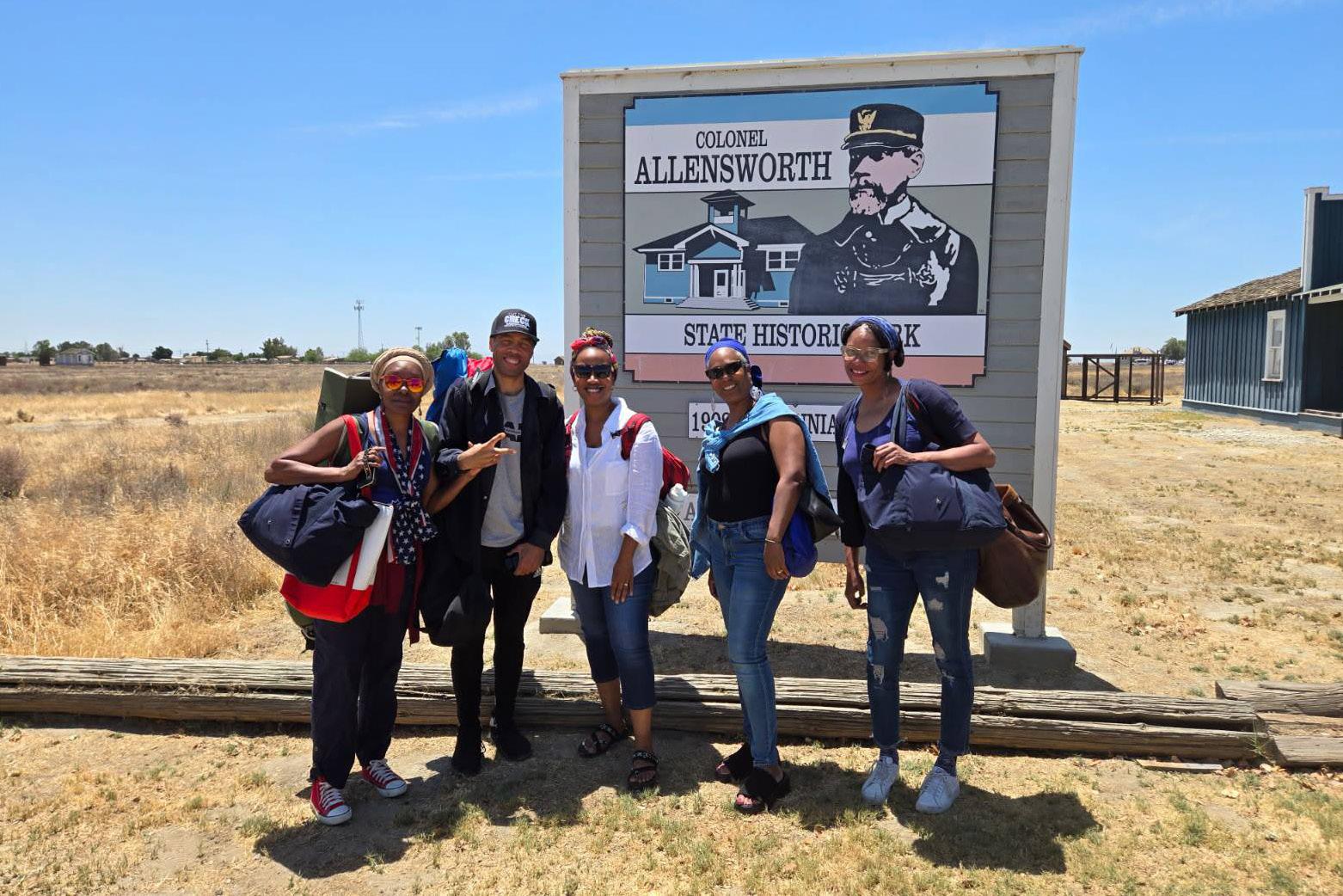
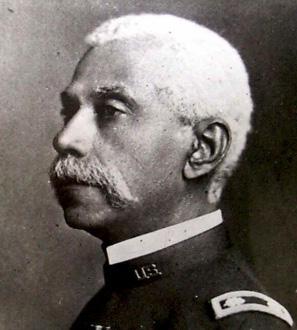
By Ife Tayo Walker Special to The Post
About twenty members of the Alumnae of Color Committee of Mills College took the special Amtrak train to celebrate Juneteenth in Allensworth, Allensworth is a historically significant community in Southern California, founded by Colonel Allen Allensworth in 1908.
Allensworth, a former slave who became the highest-ranking Black officer in the U.S. Army, led the town that had been fully financed and governed by free, Black people. In its early years, Allensworth had its own school district, businesses, and a vibrant

community life.
Preserved now as the Colonel Allensworth State Historic Park, the Friends of Allensworth manage public engagement and hold events like the one on June 14.
Allensworth is located some 45 miles from Bakersfield, California, and thanks to the San Joaquin Joint Powers Authority’s efforts in securing funding through the Parks’ California “Route to Parks” grant program, the five-hour San Joaquin line from Oakland to Allensworth was packed by Juneteenth celebrants.
This year’s Juneteenth celebration welcomed more than 1,000 visitors from all over California, including Masonic lodges, fraternal organizations, the Black Pilots Association, the Mills College Alumnae of Color Association, and other community groups.
They traveled by bus, train, and car to what felt like a big block party with food trucks, art-and-craft vendors, and entertainment by Shawn Raiford, who’s band took the audience back in time with old-school classic tunes by James Brown, Luther Vandross, the Gap Band and more.

By Joe W. Bowers Jr. California Black Media
Last week, when Pres. Donald Trump sent federal troops into Los Angeles and escalated ICE raids across Southern California, Assemblymember Tina McKinnor (D-Inglewood) didn’t stay silent. As chair of the Los Angeles County Legislative Delegation, she led more than 30 lawmakers in a Capitol press conference denouncing what she called “unconstitutional actions.”
“Mr. President, stop provoking fear and violence in L.A. County,” McKinnor said. “We are not your political punching bag. We are a strong people — we are good people.”
She urged calm, adding, “Remain peaceful. Peace is our power.”
Despite statements like these — and others from Black elected officials across the state — a narrative persists that Black leaders have been quiet. But California’s Black lawmakers are
speaking out forcefully, even if media coverage hasn’t kept pace. Assemblymember Isaac Bryan (D-Ladera Heights), co-chair of the California Legislative Black Caucus (CLBC), has been one of the most vocal critics of ICE operations. “I wasn’t just watching videos on the timeline. I was out in the streets,” Bryan said at a June 10 Capitol press conference organized by the Latino, Black, and Diversity caucuses. “They’re showing up at our elementary schools, and they’re taking children. They’re harassing our community members.”
Bryan, who represents parts of South Los Angeles and Culver City, called out ICE activity at car washes in his district and condemned the use of federal force against protesters. “Los Angeles is the home of Black and Brown solidarity,” he said. “If you attack one vulnerable community in Los Angeles, you have attacked all communities. We stand together.”
Continued on page 6

By Bo Tefu California Black Media
California has seen an 11% increase in reported retail theft from 2014 to 2023, according to a report released last week by the non-partisan Legislative Analyst’s Office (LAO).
The report, titled “Retail Theft in California: Looking Back at a Decade of Change” revealed that although rates dipped during the early COVID-19 pandemic — thanks in part to stay-at-home orders and store closures — the trend has since reversed, with a 32% spike between 2021 and 2023.
Despite the uptick, the state’s retail theft rate remains far below the historic highs of the 1980s. But lawmakers and voters have grown increasingly concerned, which led to the introduction of a number of new laws proposing tougher penalties to curb the problem.
“A combination of reduced consequences, fewer arrests, and evolving tactics by offenders has made retail theft more pervasive,” the LAO report found.
Proposition 47, passed in 2014, is cited in the report as a turning point. It reduced penalties for shoplifting and theft under $950 to misdemeanors, limiting law enforcement’s ability to arrest suspects.
The report notes this shift, along with pandemic-era changes like
early prison releases and reduced probation terms, likely reduced the odds of apprehension and incarceration — two key deterrents to crime.
The report notes that retail theft declined in smaller counties during the pandemic — measured as changes during the period between 2019. However, increases were concentrated in larger counties in the state, including Los Angeles, Alameda, San Mateo and Sacramento.
A 2024 Public Policy Institute of California (PPIC) study linked these changes to an increase in nonresidential burglaries.
In 2024, Californians voted to approve Proposition 36, a ballot initiative, that now allows prosecutors to aggregate smaller thefts into felony charges, and AB 2943, authored by Assemblymember Rick Chavez Zbur (R-Los Angeles) gives officers broader authority to arrest suspected shoplifters, even without witnessing the crime firsthand.
“These changes are designed to close the gap in enforcement that Proposition 47 opened,” said Assemblymember Rick Zbur when the law was passed. “We’re restoring balance.”
“Ultimately, we need to ask: Do the benefits outweigh the costs?” the report concludes. “And are we reducing crime without creating new disparities?”


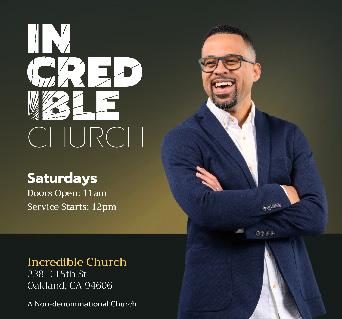


visual and media artists a poet/writer, histo rian, and dancer/choreographer who each receive $800,000 over

By Terri Schlichenmeyer
The Bookworm Sez
Editor: Damon Young, c.2025, Pantheon, Price: $28.00, Page Count: 256 pages Bust a gut.
Laugh your rear-end off. Laugh yourself silly, until you almost cry. It’s the best medicine. Roll in the aisles, holding your sides because they hurt. When something’s funny, you know it. But what does humor look like across racial lines?
In the new book, “That’s How They Get You,” edited by Damon Young, it might get the last laugh.
When he was a kid in Pittsburgh, Young thought his friend, Var Butler “was the funniest person I’d ever met.” Butler didn’t go for nasty humor and he didn’t hurt people who couldn’t defend
the Black awardees.
themselves. Instead, says Young, Butler “intuitively knew the power dynamics baked into humor…” And, as he understands now, Butler’s humor was honest, homegrown, and not “A rich-white-person thing.”
Says Young, “What makes Black humor Black ain’t the subject matter, because not all humor involving Black people is Black. Sometimes, it’s just humor.” You don’t have to be Eddie or Martin or Cedric to be funny. You could be like the many authors of the stories in this book.
In “No One Makes ‘Yo Mama’ Jokes After the Funeral” by Hanif Abdurraqib, bad timing can be awkward — but it can also be wholly, perfectly Mama “sung back to life.”
erts is excerpted from the MacArthur Fellows web site.
If you’ve ever wanted to change what folks call you, “The Karen Rights Act” by Mateo Askaripour is your story. That woman’s name says it all. Too much, in fact, but only for offending White females.
A graduate of Yale University with a law degree from Harvard, Dorothy Roberts is a legal scholar and public policy researcher exposing racial inequities embedded within health and social service systems.
Sine 2012, she has been a professor of Law and Sociology, and on the faculty in the department of Africana Studies at the University of Pennsylvania.
Nobody but Miss Ruby cooks in Miss Ruby’s kitchen — until Alex Hardy convinces his grandma that he’s capable with a spoon.
In “Unmurdered in Grandma’s Kitchen,” his meals for the family haven’t killed anyone yet.
Roberts’s work encompasses reproductive health, bioethics, and child welfare. She sheds light on systemic inequities, amplifies the voices of those directly affected, and boldly calls for wholesale transformation of existing systems.
Roberts’s early work focused on Black women’s reproductive rights and their fight for reproductive justice. In “Killing the Black
And if you’ve ever been irritated by a co-worker, then you need to read “The Necessary Changes Have Been Made” by Nafissa Thompson-Spires. When Randolph gets a new job, it seems perfect, until he is told that his perfect office must now be shared. But his new co-worker definitely doesn’t share his opinions.
Chances are that if you see “That’s How They Get You” on a shelf somewhere, you might grab it, expecting to spend the rest of your day laughing.
You’d be wrong.
While the personal essays and fiction inside this book are good – very good, in fact; some of them are downright excellent and you’ll want to turn around and read them again on the spot — many of them are not funny.
One essayist even says it: “It’s funny, really. Not ha-ha funny.”
The stories might be about humor or situations that will make you snort. There’s a theme here and it’s clever, sometimes sweet, written in perfectly cynical tones. But will you take off your glasses, wipe your eyes, and call someone to share? Not so much. Absolutely, read this book. It’s an excellent collection. You’ll enjoy what you find inside “That’s How They Get You,” and you’ll find a whole new group of writers to follow. Just be aware that if you’re looking for ROFL kinds of laughs, it could be a bust.
state intervention and the results of
of norms.
ed with Child Protective Services tions regularly punish the effects
income, and children from these families are much more likely than white children to be removed from

In “Torn Apart: How the Child Welfare System Destroys Black Families—and How Abolition Can Build a Safer World (2022),”
By Tamara Shiloh
In a musical landscape often rigid in its boundaries, The String Queens (TSQ) offer a luminous exception, one that redefines not
After nearly two decades of research and advocacy work alongside parents, social workers, family defense lawyers, and organizations, Roberts has concluded that the current child welfare system is in fact a system of family policing with alarmingly unequal practices and outcomes. Her 2001 book, “Shattered Bonds: The Color of Child Welfare,” details the outsized role that race and class play in determining who is subject to
Roberts traces the historical, cultural, and political forces driving the racial and class imbalance in child welfare interventions.
only what classical music can sound like but also who it can belong to. This dynamic trio, composed of Kendall Isadore (violin), Dawn Johnson
These include stereotypes about Black parents as negligent, devaluation of Black family bonds, and stigmatization of parenting practices that fall outside a narrow set
She also shows that blaming marginalized individuals for structural problems, while ignoring the historical roots of economic and social inequality, fails families and communities.
Roberts argues that the engrained oppressive features of the current system render it beyond repair. She calls for creating an entirely new approach focused on supporting families rather than punishing them.
Her support for dismantling the current system of child welfare is unsettling to some, but her provocation inspires many to think more critically about its poor track record and harmful design.
Sharp (cello), stands as testimony to the power of artistry rooted in community, identity, and unapologetic Black excellence. Formed in Washington, D.C., TSQ came together not simply through a shared love of music, but through an aligned mission: to use their instruments to speak truth, uplift voices, and honor legacy. All three women are educators as well as performers, and it is this dual identity that gives TSQ its unique feel. Each performance becomes not just an audible experience, but a pedagogical moment — offering lessons in strength, joy, and the richness of African American musical traditions. At the core of TSQ’s collection is an extraordinary range. Their genre-defying sound travels effortlessly from Bach to Beyoncé, from the spirituals of Black ancestors to the anthems of modern-day revolution. Whether interpreting Aretha Franklin’s soul or honoring the ancestral echoes in “Lift Every Voice and Sing,” TSQ creates arrangements that feel both timeless and urgent. Their 2019 self-titled debut album introduced many to
By uncovering the complex forces underlying social systems and institutions, and uplifting the experiences of people caught up in them, Roberts creates opportunities to imagine and build more equitable and responsive ways to ensure child and family safety.
Continued on page 7





By Emil Guillermo
As President Trump walks back civil rights and negates the notion of a federal government that cares, we celebrate this Juneteenth like never before.
And we remember how it binds all communities together in coalition.
Let’s take the positives of last weekend’s grand coincidence — Donald Trump’s military birthday parade and the counterforce of the nationwide “No Kings” rallies — and not let up.
But first we remind ourselves it wasn’t perfect last weekend.
Saturday began shockingly with the assassination of the Speaker of the Minnesota Legislature and her husband, and the near fatal shooting of another state legislator and his spouse. The suspect, Vance Boelter, 57, a Trump voter who left a manifesto which leads police to say the shootings were politically motivated.
America’s public discourse has degenerated into power plays ending with deadly shows of force not logic or consensus.
By late Sunday, the violence of Saturday came back to book-
end the weekend.
Arthur Folasa Ah Loo, 39, also known as “Afa,” was named as the protester who was shot at a “No Kings” protest in Salt Lake City. Loo, a Samoan, who appeared in season 17 of “Project Runway” as a fashion designer, was allegedly shot by Arturo Roberto Gamboa, 24, who was seen by a witness as acting as a “peacekeeping” volunteer.
Gamboa, arrested on suspicion of murder, was at the protest with an AR-15.
If you think our domestic picture is rocky, the global picture is worse. The war in Ukraine still rages on. The global trade war Trump started with his beloved tariffs continues. And now Israel and Iran are fighting a new forever war. But Trump wants to broker the peace by issuing one-sided demands to Iran. Remember: Trump’s the one who pulled the U.S. out of the Iran nuclear deal years ago because he saw it as Obama’s deal. Now, he’ll be glad to get the deal he walked away from. Meanwhile our allies are left questioning where America
Continued on page 10

Covered California Chief Medical Officer Dr. Monica Soni at the African American Male Wellness Walk discussing health care issues, including health equity and the need for coverage and care within the African American community.
By McKenzie Jackson California Black Media
Covered California is channeling $15 million from underperforming health insurance plans into a new initiative aimed at improving the health and well-being of some of its members.
The Population Health Investments (PopHI) program supports low-income families with grocery assistance, boosts childhood immunization and well-child visit rates, and helps families invest in their children’s educational futures. It also strengthens primary care practices that serve Covered California and Medi-Cal enrollees by enhancing their population health management capabilities.
Dr. Monica Soni, Chief Medical Officer at Covered California, said the goal is to improve health outcomes and reduce disparities among enrollees.
“We often think of health as something that happens inside a clinic or hospital,” Soni said. “But in reality, most of what de-
termines health happens outside those walls. We’re thrilled to bring these investments to life.”
The three-part initiative — also known as Beyond California — includes the Grocery Support Program, the Child Savings Account Program, and an Equity and Practice Transformation infrastructure project developed by the Department of Health Care Services.
PopHI is funded through the Quality Transformation Initiative, a performance-based accountability program that incentivizes the 13 health plans in the Covered California marketplace to meet benchmarks in areas like blood pressure and diabetes control, colorectal cancer screenings, and childhood immunizations. In 2023, 11 plans failed to meet those benchmarks and were penalized with fines.
“Our goal isn’t to collect money,” Soni said. “It’s to ensure that all Covered California enrollees — and all Californians — achieve the health and wellness they deserve.”
Continued on page 10
this layered sound: a blend of classical virtuosity and modern storytelling, anchored by rhythm and awe.
Their 2021 album, RISE, emerged at a particularly charged moment in American history. Dedicated to healing and hope amidst the twin crises of racial injustice and a global pandemic, RISE draws on the strength of Black spirituals, gospel, jazz, and contemporary pop. It’s a statement of purpose that tells of historical grief with hope for tomorrow. Tracks like “Lift Every Voice and Sing” and “We Shall Overcome” serve as both tribute and appeal, calling on listeners to remember, resist, and rise.
But beyond the stage and studio, TSQ’s impact is deeply shared. Each member serves as a music educator in the D.C. public school system, and their commitment to mentoring young musicians — particularly Black and Brown youth — is foundational. They understand that representation matters, and that visibility in the world of classical music remains a radical act for women who look like them.
In their presence, tradition is not discarded, but reimagined. They perform in spaces where Black string musicians have often been disregarded or invisible — Carnegie Hall, the Kennedy Center, the White House — claiming those stages with grace and power. And yet, they are just as likely to play at schools, churches, or community centers, meeting their audience wherever hearts are ready to listen.
The String Queens are more than musicians, they are cultural archivists, educators, and visionaries. Through every note they play, they challenge us to hear differently — and, perhaps, to hope differently, too.



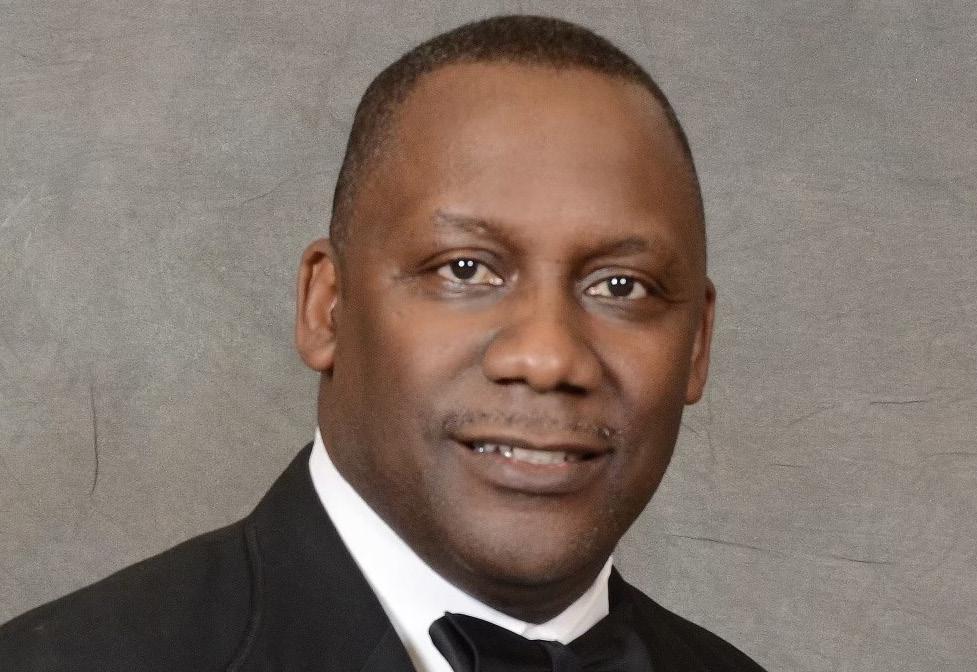
By Rev. Dr. Lawrence E. VanHook
As a pastor and East Bay resident, I see firsthand how my community struggles with the rising cost of everyday living.
A fellow pastor in Oakland recently told me he cuts his pills in half to make them last longer because of the crushing costs of drugs.
Meanwhile, community members are contending with skyrocketing grocery prices and a lack of affordable healthcare options, while businesses are being forced to close their doors.
Our community is hurting. Things have to change.
The most pressing issue that demands our leaders’ attention is rising healthcare costs, and particularly the rising cost of medications. Annual prescription drug costs in California have spiked by nearly 50% since 2018, from $9.1 billion to $13.6 billion.
Last month, Gov. Newsom included measures in his budget that would encourage greater transparency, accountability, and affordability across the
prescription drug supply chain. His plan would deliver real relief to struggling Californians. It would also help expose the hidden markups and practices by big drug companies that push the prices of prescription drugs higher and higher. The legislature should follow the Governor’s lead and embrace sensible, fair regulations that will not raise the cost of medications.
Some lawmakers, however, have advanced legislation that would drive up healthcare costs and set communities like mine back further.
I’m particularly concerned with Senate Bill (SB) 41, sponsored by Sen. Scott Wiener (DSan Francisco), a carbon copy of a 2024 bill that I strongly opposed and Gov. Newsom rightly vetoed. This bill would impose significant health care costs on patients, small businesses, and working families while allowing big drug companies to grow their profits.
SB 41 would impose a new $10.05 pharmacy fee for every prescription filled in California. This new fee, which would ap-




ply to millions of Californians, is roughly five times higher than the current average of $2.
For example, a Bay Area family with five monthly prescriptions would be forced to shoulder about $500 more in annual health costs. If a small business covers 25 employees, each with four prescription fills per month (the national average), that would add nearly $10,000 per year in health care costs.
This bill would also restrict how health plan sponsors — like employers, unions, state plans, Medicare, and Medicaid — partner with pharmacy benefit managers (PBMs) to negotiate against big drug companies and deliver the lowest possible costs for employees and members. By mandating a flat fee for pharmacy benefit services, this misguided legislation would undercut your health plan’s ability to drive down costs while handing more profits to pharmaceutical manufacturers.
This bill would also endanger patients by eliminating safety requirements for pharmacies that dispense complex and costly specialty medications. Additionally, it would restrict home delivery for prescriptions, a convenient and affordable service that many families rely on.
Instead of repeating the same tired plan laid out in the big pharma-backed playbook, lawmakers should embrace Newsom’s transparency-first approach and prioritize our communities.
Let’s urge our state legislators to reject policies like SB 41 that would make a difficult situation even worse for communities like ours.
About the Author Rev. Dr. VanHook is the founder and pastor of The Community Church in Oakland and the founder of The Charis House, a re-entry facility for men recovering from alcohol and drug abuse.




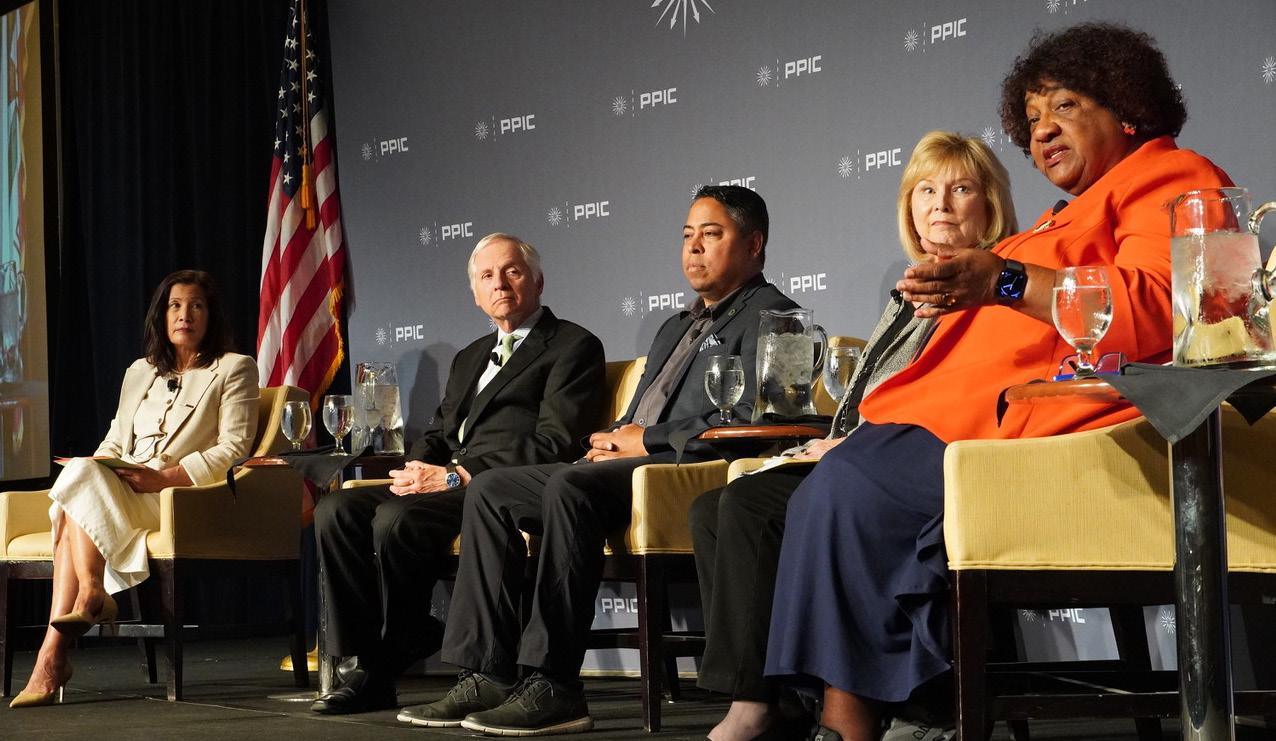
K–12 public schools rank civic engagement as a top educational priority — well behind basic academic instruction, life skills, and college prep.
Justice McConnell emphasized how that gap is most severe in low-income and rural areas.
“We spend time with teachers and administrators across the state who are trying to teach civics with almost no support,” McConnell said. “We show up any time we’re asked — because democracy depends on it.”
At the San Diego launch, Weber was introduced by former Assembly Speaker and Senate Pro Tem Toni Atkins, who is currently running for Governor in 2026. Atkins delivered an impassioned endorsement that framed Weber’s campaign as a fight to preserve core democratic values.
By Antonio Ray Harvey and Regina Wilson California Black Media
On June 12, California Secretary of State Dr. Shirley Weber participated in the Public Policy Institute of California’s (PPIC) 2025 Speaker Series in Sacramento, where she joined a panel of civic leaders to discuss how to build stronger civic education and engagement systems across the state.
By week’s end — on June 14 — she stood before a hometown crowd in San Diego, launching her 2026 re-election campaign against a tense national backdrop: the violent murders of two Minnesota state officials, escalating political unrest, and a wave of coordinated protests across the country.
That morning, Americans woke to the shocking news that two state senators in another part of the country had been shot — one fatally — along with her husband in what has been reported as politically motivated violence.
“My heart is very heavy this morning,” Weber told the crowd. “At my age, I’ve seen so much — assassinations, uprisings, and civil unrest — but I thought we had learned. I thought we had grown. And yet, here we are.”
Despite the somber tone, the moment was also one of reflection and determination. Her remarks echoed themes she had emphasized on June 12 during the PPIC event in Sacramento, moderated by Tani Cantil-Sakauye, president and CEO of PPIC. Panelists included Mark Baldassare, PPIC’s survey director; Assemblymember Jeff Gonzalez (R-Indio); and Presiding Justice Judith McConnell of California’s Fourth Appellate District.
“We’ve failed our young people,” Weber said. “This failure isn’t new. It’s generational. When people in their 40s and 50s don’t understand how their government works or why it matters, we see the results in today’s civic crisis.”
According to a June 2025 PPIC report, only 11% of California




“We’re not just here to support a campaign,” Atkins said. “We’re here to defend a principle — one that is under threat like never before. In moments like these, we don’t retreat. We rise. And we rise with leaders like Dr. Shirley Weber.”
Atkins praised Weber’s journey — from the daughter of Arkansas sharecroppers to California’s first African American Secretary of State — and her leadership in expanding voter access, protecting election integrity, and standing up to voter suppression.
“She is a trailblazer, a tireless public servant, and a fierce guardian of the ballot box,” Atkins said. “Her life and her leadership are exactly what this moment demands — principled, courageous, and unshakably committed to the people.”
Weber also shared deeply personal stories that shaped her civic identity, including how her parents — denied the right to vote in





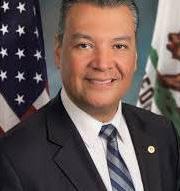
By Bo Tefu
Black Media
U.S. Sen. Alex Padilla (D-Calif.) strongly condemned the Department of Homeland Security (DHS) on June 12 after federal agents shoved him to the ground and handcuffed him while he attempted to ask a question at a press conference held by Homeland Security Secretary Kristi Noem in Los Angeles.
Padilla, who is California’s senior U.S. Senator and serves as the ranking member of the Senate Judiciary Immigration Subcommittee, was in Los Angeles as part of his oversight responsibilities, according to his office.
An aide said the Senator had been listening to Secretary Noem’s remarks when he attempted to question the Secretary about the federal government’s immigration operations.


Padilla was briefly detained after the incident but was released shortly afterward. His office emphasized that he was performing his duty of Congressional oversight at the time of the encounter.
The Department of Homeland Security defended its handling of the situation, accusing Padilla of “disrespectful political theater.”
The agency said Secret Service officers mistook him for a potential threat because he was not wearing a U.S. Senate security pin.
FBI Deputy Director Dan Bongino said Padilla “physically resisted law enforcement when confronted” and that agents acted appropriately.
The confrontation took place amid growing tension in Los Angeles over President Donald Trump’s immigration crackdown. Protests have gripped the city for several days, and the White House has deployed National Guard troops and U.S. Marines to support federal immigration agents.
Padilla said he will continue to push for accountability regarding the federal government’s actions. “This incident underscores why we must keep demanding transparency and fairness in how our communities are treated,” he added.
“If this is how the Department of Homeland Security responds to a senator with a question, you can only imagine what they’re doing to farmers, to cooks, to day-laborers throughout the Los Angeles community and throughout California and throughout the country,” Padilla said in a statement after his release.

By Edward Henderson California Black Media
Former California Sen. Steven Bradford (D- Inglewood) surprised Sacramento political insiders last Month when he withdrew his candidacy for Lieutenant Governor and announced his new campaign for State Insurance Commissioner.
Bradford previously served in the California State Senate for eight years. A former chair of the Senate Energy, Utilities and Communications Committee, Bradford authored and championed laws covering a range of issues. He also served on the Insurance Committee.
Bradford has positioned himself as a reform-minded candidate focused on restoring stability to California’s insurance market. In an interview with California Black Media (CBM), he discussed the factors leading to his decision to run for Insurance Commissioner, his plans to address high insurance prices and























his advocacy for reparations. You raised more than half a million dollars for your candidacy for Lt. Governor since you announced in 2024. Then, last month, you announced that you are running for State Insurance Commissioner instead. What led to the switch?
It was a combination of things. The fire in Altadena and surrounding areas in Los Angeles and the Palisades was one. The number of calls that I’ve received from residents saying, “Hey, we’re in a crisis situation, Steve.” You have a skill set that we feel could bring folks together. I’m honored that they feel I have the skill set to do this.
It wasn’t an easy decision for me. It took a lot of conversation and even more prayer before I decided. If you win the race for Insurance Commissioner, what would be the first thing you do to improve the relationship between the state and insurers and persuade in-















surance companies with plans to leave the state to stay?
First, bring everybody in the room. You’ve got to have a good dialogue. You’ve got to understand those challenges that are driving them out and preventing them from providing insurance. At the same time, we need to find out what those pinch points are for consumers. I’m not going to say I have all the answers. It’s going to require me to surround myself with experts that know more than me.
As more Insurance companies leave California, does the state have enough money to sustain the FAIR plan for homeowners?
It’s a challenge there; it’s about a billion dollars short right now. There is legislation that is trying to allow the FAIR plan to bond and raise funds if there’s a shortage. If it passes, that will help greatly in monetizing and paying for the program.
A lot of people in the communities we serve complain that insurance rates are too high and information about coverage is not straightforward. Do you have plans to dress these concerns?
It takes understanding what those costs are, what’s driving those costs. But we’ve got to be honest about it. California has some of the most expensive real estate in the country — if not in the world. So, it’s going to cost more to insure here.
You served on the Reparations Task Force. Are you still engaged in advancing the recommendations the task force made to the Legislature?
I’m constantly being asked my opinion on how things are going. There are some challenges, but we still have to keep trying to stand up some of those 115 recommendations in the reparations task force report.
the Jim Crow South — opened their Los Angeles home as a polling place.
“My mother served pie and pound cake to voters in our living room,” she said. “That was her way of standing for democracy.”
Now, as Secretary of State, she said she’s fighting a constant stream of legal and political attacks aimed at undoing that legacy — from attempts to restrict vote-by-mail access to efforts to purge voter rolls and shorten voting windows.
“We’re fighting lawsuits every day,” Weber said. “And we will not back down — not when others gave so much to secure the rights we now have.”
She also announced that her office will commemorate the 60th anniversary of the Voting Rights Act of 1965 with a year-long campaign to educate Californians on the law’s history and the ongoing threats against it.
“This isn’t just a commemoration. It’s a defense,” she said. “We must remind the next generation that people sacrificed everything for the right to vote. And that sacrifice must never be forgotten or undone.”
Weber made it clear that her campaign is not just about re-election, but about preserving the integrity of California’s democracy.
“This is not a moment. This is our life,” she said. “Defending voting rights, protecting access, and empowering our communities isn’t something we do once every four years. It’s something we do every single day.”




























































































































































































Launched in February, the Grocery Support Program will distribute $11 million to 13,000 enrollees and 7,000 households this year. Participants — who must have chronic conditions such as asthma, diabetes, or hypertension and report food insecurity — receive at least $80 per month on a reloadable debit card to purchase fresh food, packaged goods, baby food, and nonalcoholic beverages. Eligible households must earn no more than 250% of the federal poverty level.
“It’s hard to manage a chronic condition when you’re worried about your next meal,” Soni said. “Food insecurity makes it nearly impossible to maintain good health.”
The Child Savings Account Program, launched in March, deposits up to $1,000 into CalKIDS savings accounts for 272 children under age two who are Covered California members. The funds are tied to the
completion of well-child visits and vaccinations, encouraging preventive care while supporting future educational expenses.
“Every parent or caregiver is hopeful about their child’s future,” Soni said. “There’s a clear link between good health and educational opportunity. This program supports both.”
In addition, 46 primary care practices across California received a $2 million investment to enhance data integration, access expert support, and participate in virtual learning and peer engagement to leverage Equity and Practice Transformation infrastructure.
Covered California plans to expand the Child Savings Account Program as it evaluates PopHI’s overall impact.
“We’ve never done anything like this before,” Soni said. “We’re moving millions of dollars from underperforming health plans back into the hands of our enrollees. As we plan for 2026, we want to learn what’s working and what more is needed.”

By Bo Tefu
California Black Media
Sen. Akilah Weber Pierson (D-San Diego), chair of the California Legislative Black Caucus (CLBC), last week congratulated Sen. Monique Limón (D-Santa Barbara) after she was named Pro Tem Designee of the California State Senate.
“Senator Limón’s selection as the first woman of color to be named Pro Tem is nothing short of historic,” Weber told California Black Media. Limón is Latina.
“Her leadership represents the voices of communities long underrepresented at the highest levels of state government,” Weber continued. “I look forward to working along-
REQUEST FOR QUALIFICATIONS (RFQ) FOR HOUSING OPPORTUNITIES FOR PEOPLE WITH HIV/AIDS (HOPWA)
Contract Amount: TBD Terms: 3 Years
Project Description: The City of Oakland, Department of Human Services, Community Homelessness Services Division, seeks a qualified community-based organization, local nonprofit or government agency to administer HOPWA funding within Alameda County and Contra Costa County. The agency would work to ensure that affordable housing options and related housing services are available to low-income People Living with HIV/AIDS (PLWHA) and their households. Services and housing will be focused on assisting this population of our communities in achieving and maintaining housing and improving their access to, and engagement with, HIV/AIDS treatment and care. The agencies selected will administer programs and services to ensure that participants receive support from the HOPWA program for stable housing, reducing the risks of homelessness and improving participants’ access to health care and related supportive services.
Proposal Submittal Deadline: Friday, July 25th, 2025, by 2:00 P.M. via iSupplier.
Reminders:
• All who wish to participate in this RFQ must register (at least 5 days prior to submittal due date) through iSupplier at (https://www.oaklandca.gov/services/register-with-isupplier) to avoid last minute submittal complications and receive addenda/updates on this RFQ. For additional help registering and submitting your proposal to iSupplier please watch the user guide videos at (https://www.oaklandca.gov/documents/isupplier-user-guides). Receipt of a confirmation email indicates that a proposal was successfully submitted.
• Did not receive and invitation? Start Early with iSupplier registration. Upon completion of registration, send an email to iSupplier@oaklandca.gov listing “RFQ for HOUSING OPPORTUNITIES FOR PEOPLE WITH HIV/AIDS (HOPWA)” as the subject and request an invitation to the RFQ. The Contract Analyst will add your business to the RFQ invitation.
• The following policies apply to this RFQ: Equal Benefits • Living Wage • Campaign Reform Act • Professional Services Local Hire • Prompt Payment • Arizona Boycott • Dispute Disclosure • Border Wall Prohibition • Sanctuary City Contracting and Investment Ordinance. Answers to Questions:
1. For project-related questions contact Contract Administration at contractadmin@oaklandca.gov
2. For iSupplier related questions after registration contact iSupplier@oaklandca.gov
Asha Reed, City Clerk and Clerk of the City Council, (Friday, June 20, 2025) The City Council reserves the right to reject all proposals.
side Senator Limón to advance equity, justice, and opportunity for all Californians.”
On June 9, California Senate President pro Tem Mike McGuire (D-North Coast) announced that the Senate Democratic Caucus had unanimously selected Limón as the Pro Tem Designee. The leadership transition is scheduled to take place in early 2026.
“Serving as the Leader of the State Senate is the honor of a lifetime,” McGuire said. “And today, the Senate unanimously elected Senator Limón as the Pro Tem Designee. Sen. Limón always puts people first, she’s a bridge builder and never stops fighting for progress. We are going to be well served under her leadership and the Golden State will be stronger thanks to Sen. Limón’s commitment to the communities of this great state.”
Limón currently represents California’s 21st Senate District, which includes communities such as Santa Barbara, Ventura, Oxnard, and Santa Maria. She serves as Chair of the Senate Democratic Caucus, Chair of the Senate Natural Resources and Water Committee, Vice Chair of the California Legislative Women’s Caucus, Vice Chair of the Central Coast Caucus, and Chair of the Senate Select Committee on the Nonprofit Sector.
“I am grateful to have the support of my colleagues to be the next President pro Tempore of the California State Senate,” Limón said. “At this critical time in our state, I am committed to working with my colleagues and remain dedicated to defending our California values and uplifting all of our communities. Together, we will build diverse coalitions and develop solutions to the most pressing issues of our time. I want to thank President pro Tempore Mike McGuire for his continuous steady leadership and unwavering commitment to Californians.”

By Bo Tefu
California Black Media
U.S. Rep. Maxine Waters (DCA-43) joined former President Bill Clinton, New York Gov. Kathy Hochul, House Democratic Leader Hakeem Jeffries, New York City Mayor Eric Adams and other politicos at a funeral mass held to honor the life and contributions of former U.S. Congressman Charles B. Rangel.
The service was held on June 13 at St. Patrick’s Cathedral in New York City.
“This weekend, the country lays to rest a true giant, Congressman Charles B. Rangel,” said Waters of Rangel in a statement.
Rangel, who served in Congress for nearly five decades, was a decorated Korean War Vet and who became the first Black chair of the House Ways and Means Committee.
He died in Harlem on May 26 at 94.
“I offer my deepest condolences to his two children, Steven and
... Continued from page 7
stands on anything. If I were Trump, I’d listen hard to the message of the “No Kings” protesters.
JUNETEENTH BINDS US
So we come to Juneteenth as a reminder that our communities have much in common — the long struggle for social justice.
Alicia, his grandchildren, and all those who loved him. Charles was a colleague, friend, and one of the most profound legislators this country has ever seen,” said Waters, who is the Ranking Member of the U.S. House Financial Services Committee.
Waters, a former California Assemblymember, also recognized Rangel for being a founding member of the Congressional Black Caucus,
“The Congressional Black Caucus advocates for policy and legislation that ensures equal rights, opportunity, and access for Black Americans and other marginalized communities in America,” she added.
Remembering how Rangel’s leadership impacted the Black Press and Black economic empowerment in New York and around the country, Waters called her former colleague “a national treasure” who will be “dearly missed.”
‘Rangel combined his leadership with some of the most outstanding leaders of his generation - David Dinkins, Basil Paterson, and Percy Sutton - to form ‘The Gang of Four,’ also known as the Harlem Clubhouse. This powerful coalition of Black men shaped political power, supported civic institutions, media outlets, and economic development in Harlem, provided backing for minority-owned businesses, and advocated for fair housing, labor rights, and equitable education,” Waters
overtime. Slavery ends in 1862, and no one tells you until 1865? That the delay even happened is mindboggling. But ask any American, no matter their ethnicity, and this simple factual detail of the foot-dragging of truth is often lost in the telling of history. And it’s not “critical race theory.” It’s just the truth. Juneteenth just shows how long it took to get the truth out and eradicate an evil and immoral chapter in American history.







McGuire has served as Senate President pro Tem since February 2024. He represents California’s North Coast, stretching from the Golden Gate Bridge to the Oregon border.
Just think of what we celebrate. It’s the slow roll of freedom when slaves in Texas finally got the news on June 19, 1865, that slavery had ended more than two years earlier — with the signing of the Emancipation Proclamation on Sept. 22, 1862.
Until the U.S. Army came in, Texans had slaves working

Let’s remember: June 19th is a date that binds us together. About the Author Emil Guillermo is a journalist, commentator, comedic stage performer and a poet laureate in Northern California. See his micro-talk show on YouTube.com/@emilamok1
Request for Proposals (RFP) for Environmental and Design Services for the I-680 Express Lane/High Occupancy Vehicle Lane Project (RFP No. R25-0006)



The Alameda County Transportation Commission (Alameda CTC) is seeking proposals for a contract to commence services in December 2025, or as indicated in the RFP and/or appropriate addenda.
Key Dates: • Optional Online Pre-Proposal Meeting is scheduled for Friday, June 20, 2025 at 10:00 a.m. Pacific Time (PT)
• Proposal due date: July 14, 2025, BEFORE 3:00 p.m. PT
All RFP documents are available Procurement Portal at https://alamedactc.bonfirehub.com.
All questions regarding this RFP must be submitted via the Procurement Portal, no later than 1:00 p.m. PT on June 26, 2025.
Submittals must be made in accordance with the instructions in the RFP. Any contract awarded must be in compliance with the local, state, and/or federal requirements.

10,000 Rally in Oakland for ‘No Kings’ Protest ...
Continued from page 1
San Francisco, Albany, Berkeley, Hayward, Dublin, Walnut Creek, Palo Alto and San Jose.
The Oakland protest, which was organized by Indivisible East Bay and other groups, gathered at Wilma Chan Park in downtown, and marched to Frank Ogawa Plaza for a rally.
Among the speakers were Oakland Mayor Barbara Lee, Congresswoman Lateefah Simon, Assemblymember Mia Bonta, Oakland City Councilmember Carroll Fife, Alameda County Supervisor Nikki Fortunato Bas, pastor Mike McBride and attorney Dan Siegel.
“We have the right to protest,” said Mayor Lee,” speaking at Wilma Chan Park before the march to Oakland City Hall.
“(We have) a right to make sure that our government is not unlawful and that it uplifts and supports the Constitution,” she continued.
“Let’s circle the wagons; let’s make sure our immigrant community knows that we stand with them and we’re not going to allow any outside interference in our community.”
“We are coming,” said Simon.
“We are coming with ballots. We are coming with protests. We are coming with policy. We are coming with the poetry of the truth. No crowd will save you. No fear will break us. We will never kneel to a king.
“We will show them that we will never throw trans children under the bus. We will be voting in 2026. We will show them who we are,” Simon said.
“We are not backing down, and the people who do have the privilege of citizenship should be putting their bodies on the line to make sure that our neighbors, our families, our friends, have what they need to be safe,” said Fife.
“We don’t believe in kings, not in Sacramento, not in Washington, D.C. and certainly not in Tel Aviv…We are here today because men have supported the massacres of children,” said Zahra Billoo, executive director of the San Francisco Bay Area chapter of the Council on American Islamic Relations (CAIR).
“In a democracy, there is no king. In a democracy, there is no dictator. We the people reject anyone being king,” said McBride.

By Kiley Russell Bay City News
Thousands of UCSF Benioff Children’s Hospital Oakland workers walked off the job early Wednesday morning to begin an open-ended strike over a systemwide reorganization plan.
Some 1,300 members of the National Union of Healthcare Workers who currently work directly for Children’s Hospital Oakland are slated to be moved into employment with UCSF Health.
The two separate organizations run the hospital system together and say that by “unifying the workforce” they will be able to improve long-term growth prospects and strengthen their ability to provide care.
By integrating NUHW into the UCSF Health workforce, however, the administration is canceling union contracts and cutting take-home pay for approximately 2,500 East Bay workers, including NUHW workers, members of the California Nurses Association and the International Union of Operating Engineers Local 39.
“We’re determined to stop UCSF from canceling our contracts, because it would make it harder for us to provide for our families and advocate for the East Bay kids we serve,” said pharmacy technician Marques Williams.
NUHW leaders say their members would lose about $10,000 in take-home pay, as well as their seniority, because of the plan.
Continued from page 1
of the forthcoming grant from the city will be used for this site. This announcement was received with excitement and enthusiasm.
Councilmember Charlene Wang shared that her priorities for District 2 include finding solutions for the unhoused, those who are trafficked and the undocumented. Rebecca Kaplan, former vice mayor and city councilmember, gave a keynote address imploring the audience to take care of the most vulnerable people in our community by leading with love and kindness.
The common sentiment shared by both civic leaders and attendees is that we are in unprecedented times, and the concern for the well-being of our community is heartfelt and sincere. In the current climate, awareness is not enough. Classes on “knowing your rights” are important, but we must go further — we must rise together and protect those most vulnerable among us.
The group also addressed the increasing presence of ICE raids, particularly in sanctuary cities and progressive areas. It was affirmed that churches, by law, retain the right to deny entry to any individuals they deem unfit — an essential safeguard that can provide refuge for those in danger.
As the meeting ended, Vanessa Russell, executive director of Love Never Fails made the following comment, “Love Never Fails is honored to partner with Williams Chapel Baptist Church in launching a Safe Car Park Program, providing a safe place for our unhoused and trafficked neighbors to sleep in their vehicles overnight.”
Pastor Phyllis Scott, president of Oakland chaplain’s stated, “Faith leaders came together in solidarity side-by-side with a common goal of bringing peace and hope to those in need in the city of Oakland. The Pastors of Oakland and leaders of Love Never Fails are committed to leveraging their resources to support the needs of clients served at the Williams Chapel site.”
“Seeing leaders of different faith traditions commit to solving the problems discussed at this meeting is a step in the right direction and in alignment with Mayor Lee’s vision for one Oakland. There, we will present an implementation plan,” concluded ICAC Board member Dr. Kimberly Mayfield.
The next meeting will take place at Williams Chapel Baptist Church on July 10 from 1 p.m.2:30 p.m.
Continued from page 1
Branch, Oakland Promise, Legacy Funds of Holy Names University, and Business Legal Management.
Oakland NAACP Branch President Cynthia Adams encouraged students to make their mark in the world and join the NAACP and Black Student Unions wherever they go to college.
“It’s important to develop your skills and build community where you land in college and take advantage of your school’s resources,” said Adams. “Without my staff, sponsors, and supporters we could not provide this level of support to deserving students.”
NAACP Oakland Treasurer Sandra Johnson.
Adams encouraged students excited to speak about the college they would attend in the fall while current college students provided advice and encouragement to incoming freshmen.
Royal Hubbard, a fashion design and merchandising major at Seaside College was also presented an award. His mother, Charlene Richardson, and her twin sister, Charlette Richardson, proudly took photos with Hubbard and the president of the Oakland NAACP.
City Leaders Talk Public Safety and Funding ...
Continued from page 1
get work experience, is not being funded in the 2025-2027 fiscal budget, officials are trying to find alternative funds to support the effort.
So far, the city has raised about $50,000 but needs much more than that, Lee said.
Executive Director of the Oakland Workforce Development Board Sofia Navarro said Oakland hopes to secure $2 million in funding from public and private investors to reinstate the summer program, and several conversations and deals are underway to achieve that.
The host panel also included public safety leaders Oakland Police Department (OPD) Chief Floyd Mitchell and Violence Prevention Chief Holly Joshi.
Mitchell said although it may feel to residents that crime is still rampant across the city, overall crime is trending down and has been since last year.
Public safety and rising crime rates were the driving forces behind the recall of former mayor Sheng Thao, who was ousted late last year. Recall supporters blamed Thao and the lack of a police chief for nearly a year for the constant robberies, violent crimes, and carjackings reported in Oakland since 2022.
According to OPD crime data, crime has decreased dramatically.
As of June 16, robbery crimes are down 42% and burglary is down 20% since 2024. Overall crime also is down 30% from last year.
But Mitchell said the data doesn’t always show the full picture. He understands that businesses and residents often do not report
crimes because of their distrust of law enforcement or not wanting to cooperate with investigations.
When asked when OPD will start hiring more police officers to meet the 700-officer mandatory staffing quota under Measure NN, which increased an existing property tax and parking tax surcharge for nine years, Mitchell said the process will take time.
He explained that the department loses five to six officers a month due to retirement or new job opportunities, and it can take 12 to 14 months to hire a replacement officer.
Council member Kevin Jenkins briefly spoke on the homelessness crisis in the city, calling homelessness the “moral crisis of our time,” but emphasized that it does not excuse people from committing crimes or using encampments as a way to hide from their consequences.
Oakland recently allocated funding for the Homeless Prevention Pilot Program which aims to reach at-risk or newly displaced people by providing needed services like housing before they end up chronically on the streets. Jenkins said the county is also in charge of keeping streets clean, but much of the burden has fallen on Oakland, which has the largest share of homeless residents in Alameda County, to sweep people from encampments.
He said the city is working with the county to acquire Measure W funding that would help toward housing homelessness services.
“We have to act with compassion, but we also have to have clean and clear sidewalks,” Jenkins said.
The Case Against Probate ...
Continued from page 1
plan in Alameda County’s probate court as the beneficiary of Head’s estate, where, in a devastating blow to truth and justice, the California Court of Appeal upheld a lower court ruling invalidating Head’s estate plan based on false and misleading information according to Jendayi.
and Head’s 28-year relationship as professor, advisor, mentor, sorority sister and friend.
Hospital officials acknowledge that some workers might see a drop in take-home pay, since they currently pay nothing toward health insurance or retirement, but “will gain access to a far more valuable pension and comprehensive, long-term benefits.”
Union leaders said they filed a grievance about the hospital’s plan over allegations that it violates a contractual prohibition against subcontracting but Children’s Hospital Oakland has refused to select an arbitrator.
In response, NUHW filed a lawsuit seeking to compel arbitration. A federal judge is scheduled to hear the complaint on June 26, according to union officials.
It’s unclear how long the strike might last but currently the hospital’s locations in Walnut Creek and Brentwood are closed.
Hospital officials said they are disappointed with the strike and how it’s disrupting operations but said that critical care services like the emergency department and operating rooms are still up and running.
Patients are being notified by their clinics if their appointments change and if people have questions about an appointment, they can call Patient Relations at (415) 353-1936.
The striking NUHW members include nursing assistants, respiratory therapists, housekeepers, clerical workers and medical technicians.
Adams also shared her appreciation for event coordinators; Oakland NAACP Imani Youth Council - ACT-SO Co-Chair Patrice Waugh, ACT-SO Co-Chair J. Natre’ Burks, NAACP Oakland First Vice President Pamela Ferran, Esq., NAACP Oakland Secretary Kaelyn Perkins, and
“I am excited about my future and making my family proud,” said Hubbard. “I also want my peers to know the importance of connecting with your professors, networking, and taking advantage of all the available support and resources on campus.”
Southern Jazz Kitchen provided a soul food dinner for guests.
Continued from page 1
cans more than two years after the Emancipation Proclamation was signed.
As we head into the weekend full of festivities and summer celebrations, I want to offer a friendly reminder about who is not invited to the cookout: litter.
At Clean California, we believe the places where we gather—parks, parade routes, street corners, and church lots—should reflect the pride and beauty of the people who fill them. Our mission is to restore and beautify public spaces, transforming areas impacted by trash and neglect into spaces that reflect the strength and spirit of the communities who use them.
Too often, after the music fades and the grills cool, our public spaces are left littered with trash. Just as our ancestors took pride in their communities, we honor their legacy when we clean up after ourselves, teach our children to do the same, and care for our shared spaces.
Small acts can inspire big change. Since 2021, Clean California and its partners have collected and removed over 2.9 million cubic yards of litter. We did this by partnering with local nonprofits and community organizations to organize grassroots cleanup events and beautification projects across California.
Now, we invite all California communities to continue the incredible momentum and take the pledge toward building a cleaner community through our Clean California Community Designation Program. This recognizes cities and neighborhoods committed to long-term cleanliness and civic pride.
This Juneteenth, let’s not only celebrate our history—but also contribute to its legacy. By picking up after ourselves and by leaving no litter behind after celebrations, we have an opportunity to honor our past and shape a cleaner, safer, more vibrant future.
Visit CleanCA.com to learn more about Clean California.
The appellate court affirmed Judge Sandra K. Bean’s controversial decision, which was widely criticized by attorneys, legal strategists, and probate activists for relying on disinherited relatives, reversing the burden of proof without cause, and disregarding clear trial evidence.
The appellate panel’s affirmation repeated many of the same inaccurate claims found in Bean’s ruling, suggesting they did not thoroughly review trial transcripts.
On Oct. 17, 2024, the Appellate Court upheld Bean’s ruling that Head’s estranged sisters had legal standing to sue under Probate Code §17200, despite the sisters having been excluded from all legal documents, their false statement that Head’s sister, Della Hamlin, had been given power of attorney (POA), which contradicted testimony by Kaiser Hospital social worker Jennifer Hopping.
Hopping instead testified that Head had legally appointed Jendayi as her POA; that Head was isolated, vulnerable, and completely dependent on Jendayi, while medical, hospice staff, Dr. Head’s colleague, the notary and attorney all confirmed her mental stability and autonomous decisionmaking; that Attorney Leahy’s, the sister’s attorney’s petition was properly amended, despite no documentation showing standing or claims of financial elder abuse; that Dr. Head’s trust was the result of “undue influence,” though not a single witness testified that Jendayi exerted any; and that the trust was “inequitable” because Jendayi received real property, despite clear evidence of Jendayi
“One of the most egregious and insulting claims, repeated by both Judge Bean and the appellate court, was that I gave estate attorney Elaine Lee the names of the trust beneficiaries,” implying that Zendaya named herself the beneficiary instead of Head.
“When opposing counsel, attorney Daniel Leahy, made this false claim at trial, I immediately objected, but Judge Bean cut me off, stating dismissively, ‘It’s only argument. You can give me your argument later.’
“When the truth was that Elaine Lee, a seasoned estate planning attorney met privately with Dr. Head and testified under oath that Dr. Head named me as her sole beneficiary and did so while she was lucid and clear. Dr. Head explicitly stated she wanted nothing to go to her estranged sisters.
“Yet both courts chose to believe Leahy, a white man who never knew Dr. Head, over Lee, a respected Black attorney who sat with Dr. Head behind closed doors and honored her final wishes.
“This is more than a probate dispute; it is a judicial failure. A Black woman’s final wishes were dishonored, a trusted attorney’s testimony was disregarded, and a devoted friend was criminalized by assumption and distortion,” Jendayi says.
“I urge community members, legal scholars, and civil rights advocates to demand accountability and support my effort to expose this miscarriage of justice. I filed a petition of writ of certiorari to the Supreme Court of the United States on June 16, 2025. Dr. Head’s legacy and the principle of truth in our courts depends on it."
(A “writ of certiori” is the formal request that the Supreme Court order a lower court to send up the record of the case for review, according to Wikipedia.)